The RESURGAM project is dedicated to advancing Friction Stir Welding (FSW) as a technique for welding steel, with a focus on achieving high integrity, minimal distortion, and environmental sustainability. The project also aims to develop an underwater, robotic FSW process to enable repairs on marine structures without the need to bring ships or platforms to a dry dock.
Following a successful demonstration of steel friction stir welding with a specially designed head for a CNC machine at a shipyard in Istanbul, the consortium seized another opportunity to showcase project results during the final demonstration held from January 15-18 in Cumbria, UK.
During the Cumbria demo, the UL CRIS team was responsible for the cleaning and scanning of the ship hull metal crack simulation plate. We also conducted the 3D reconstruction of the damaged area. The successful completion of the tasks involved the utilization a small-size Remotely Operated Vehicle (I-ROV) equipped with UL’s developed control system OceanRINGS, a laser scanner, and high-resolution camera.
The ROV remote presence control exercise was also conducted by a member of team situated thousands kilometres away from Forth Cumbria facilities and performing the near real-time control of the vehicle, accessing the OceanRINGS control system through a TeamViewer link.
For more details on the RESURGAM project, please refer to this link.
If you are interested in RESURGAM training, you can find further information here.
CRIS TEAM included: Phillipe Cardoso Santos, Anthony Weir, Helio Musslewhite-Veich, Luke Fitzgerald and Edin Omerdic (remotely).


